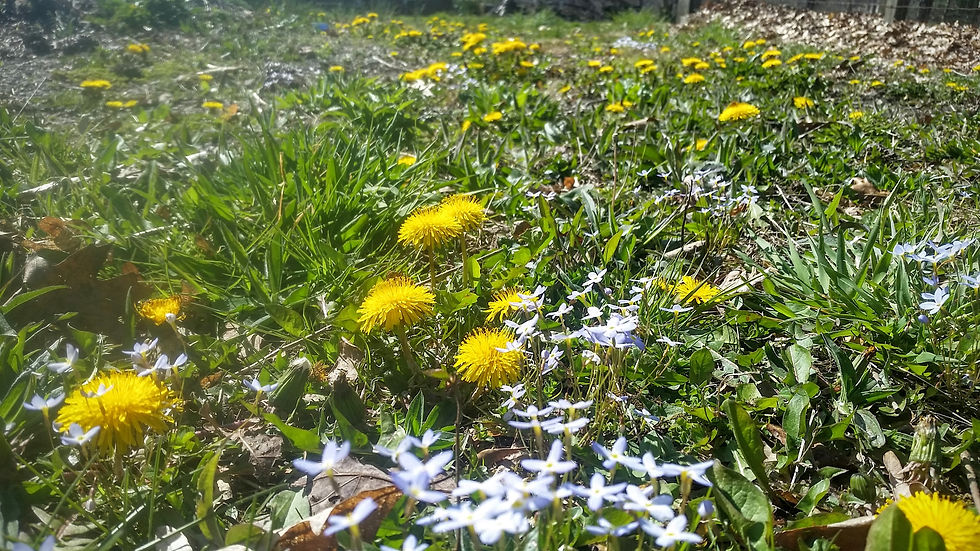How can you help the pollinators?
- Michelene C

- Aug 20, 2016
- 3 min read
It's super easy! Read on for simple ways you can make a big difference.


Dandelions are one of the first flowers of spring. These flowers are important to the butterflies, bees, and other pollinators. You can make a big difference by mowing the grass as little as possible or on a high setting so the pollinators still have dandelions for food. Speaking of flowers in the yard - please don't treat your yard with pesticides or herbicides (if possible). There are studies that show increased risks of cancers in dogs who are exposed to herbicides in treated yards. Some dog breeds have higher cancer risks than others but why chance it? Keep the flowers for the bees and the crab grass for the dogs.

Bug habitats are a great addition to any yard. I bought this little bug house for $10 at my local Aldi's grocery store. You can also build a beautiful habitat with many of the things you may have laying around the house (scrap wood, old flower pots, the list is endless). Plan a rainy day activity with the kids and whip together something spectacular. You can find some inspiration here.

Plant a plethora of native flowers that will bloom throughout the year. As the bees are winding down from the spring honey flows, the hot months of summer can be slim pickings on nectar. Honey bees have to store about 60+ pounds of honey to get them through a Pennsylvania winter. My favorite flower to plant (with fall honey in mind) is sunflowers. Many pollinators love sunflowers for their lush nectar and prevalent pollen packed into their beautiful blooms. You'll make the bees happy and have some show stopping fall flowers to show off. Many companies cater to pollinator friendly flowers. Seedles sells seed bombs of flowers that are native to your neck of the woods and seed bombs are easy. Throw them where they'll get light and rain and BAM! you have flowers. High mowing seeds sells a pollinator mix - as do many other seed companies. Bee sure to check that the seeds you buy were NOT treated with insecticides or other chemicals. Remember - this is meant to be food for the insects. You wouldn't want, um, something that might be called humanicide to be in your human food.

Did you know bees have to drink water every day? I don't imagine their doctor telling them to try for 8 glasses or anything but they still need a drink. This causes a lot of unintentional run-ins during the hot months of the summer. People are cooling off in pools or with slip'n slides. A bee or other insect will land on them for a drink. MAYHEM ensues. The bee/insect really doesn't know you from a tree in the ground (seriously). They saw your arm or hair or hat as a way to get a drink without the risk of drowning in the raging current of the garden hose.
A bee waterer can be a great way to offer your pollinators a drink. It can be made from anything that is shallow, will hold water, and has something for the pollinators to rest on while they drink. I use plant saucers - big plastic trays that are meant to catch run off from indoor flower pots - and rocks. These are shallow enough that the water dries up every other day with no rain. This is important because you are not making a bath house for mosquitoes to multiply. The rocks give the bees something to stand on so they won't drown. You could hang something along these lines (just lighter) outside of a window so kids can observe all the insects that need a drink on a steamy summer day. They'll be watching from the safety of a window. This is a great idea of kids or anyone who is afraid of bees/wasps/hornets.

Do you like fresh herbs? Did you know that growing them and letting them flower could be helping the bees and other insects self-medicate and decrease parasite loads? It's true. I am a dedicated fan of growing your own food in whatever ways you have space for. Herbs are easily grown in pots that can be put outside during the summer and brought in during for the winter. Planting perennial herbs like dill, lavender, sage, thyme, oregano, and rosemary* will give you beautiful plants year after year in your garden that can be eaten, dried, and are very beneficial to everyone all the way around.
*the list goes on and varies by growing zone

I hope any one of these things has inspired you to plant something, do something new, or just to go outside and enjoy the view. I'll see you out there. #BeeAdventurous #honeybees #protectPollinators

Comments